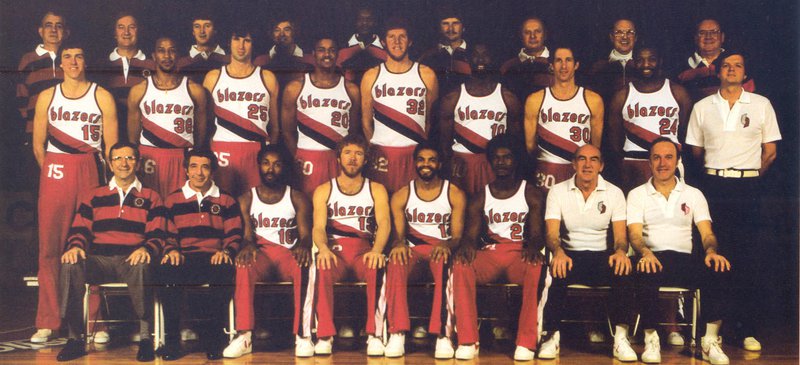
Bob Gross (1953-)
Bob Gross, according to Jack Ramsay
All players were required to complete 300 rope jumps in two minutes and a mile-run in six minutes or less on the first day of the Portland Trail Blazers training camp in the fall of 1976. Players were informed well in advance of the designated date, and everyone appeared in good physical condition on the opening day of camp. They breezed through the run, but many hadn’t done a lot of rope-jumping and that proved to be more challenging than the mile run. Before he started on his rope-jump segment, Bob Gross asked me if double-jumps counted for two jumps. When I asked him to demonstrate he complied, bounding high enough for the rope to pass under his feet twice before he hit the floor. I agreed to have it count for two jumps. Using that technique, Gross completed the requirement with 150 jumps off the floor, but with 300 turns of the rope—and finished well under the two-minute time limit. I was impressed.
That incident was only the first of many demonstrations of the athleticism and fundamental skills that Gross possessed. In drill work, he ran effortlessly and with very good speed, and he showed excellent floor vision and sound passing techniques. He had very good leaping ability, balance, and coordination. He moved easily without the ball, finished close-in shots above the rim, and had a feathery-soft touch with accurate jump shots. He was also a leech-type defender. And perhaps best of all, he showed a quick understanding of the up-tempo game I wanted to install, and he loved playing a role in it.
As a rookie the previous season, Gross had earned increased playing time from Coach Lenny Wilkens late in the year and had grown confident that he was good enough to play in the NBA. In my first training camp with the team, Gross and Bill Walton developed an unspoken connection for passing to the other. Walton specialized in bounce passes from the post to Gross on back-door plays; Gross lobbed passes at the rim that Walton threw down with emphasis. It was beautiful to watch.
By the time the 1976–1977 season began, Gross had beaten out Larry Steele and rookie Wally Walker as the starter at small forward. All three were the “relentless” runners required by that position, but Gross’s overall skills gave him a decided advantage. Gross was the only Blazer to play in all 82 games that season.
Gross was the fourth leading scorer for the Blazers that season—averaging 11 points, just under 5 rebounds, and 3 assists—not eye-opening numbers. But he was very consistent (he shot 53 percent from the field and 85 percent from the free-throw line), and he proved to be invaluable in end-of-the-game plays as a screener, passer, or shooter. Gross set solid screens, made unerring passes, and seldom failed to knock down an open shot in those critical situations.
Bobby became the Blazers’ key player in the NBA Finals against Philadelphia, where he was matched up with the Sixers’ star forward Julius Erving. Erving was a great scorer for the Sixers, but he was a lax defender, unwilling to chase his man around screens. Going into the series, I knew that Gross was going to get a lot of good scoring opportunities.
With the series tied, 2-2, Gross scored a team-high 25 points in the fifth game, played in Philadelphia. Portland had taken a 12-point lead at halftime in that game, but the Sixers rallied and closed the gap to six points late in the fourth period. I took a time out and called for a “Red play” that brought Gross off Maurice Lucas’s baseline screen. Bob was wide open when he got the ball and drained a 17-foot jumper that proved to be the game clincher. In the series finale in Portland, Gross led the team in scoring with 24 points—again using his constant running and maneuvering off screens to get open looks against Erving.
Many years later, Gross remembers those games with great fondness. “It was the only time all year that the team ran plays for me,” he recalled recently. “I knew I could get open, so it was just a matter of knocking down the shot.”
Bill Walton was the MVP of the NBA Finals that year—and deservedly so. In Game 6, Bill scored 20 points, had 23 rebounds, 8 assists, and 5 blocked shots. But Gross was just a tad less vital to the Blazers. He played his best game—he scored consistently on high percentage shots, passed to open teammates, and did an overall good job defending Erving.
Gross yet remembers that series as the highlight of his NBA career. “It was the best time of my basketball life,” he said many years later.

Portland Trail Blazer, 1977-1978. OHS Research Lib.
